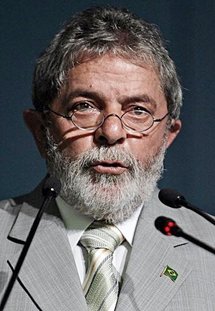
Brazilian President Luiz Inacio Lula da Silva
Farinas said he felt weak from his effort but was resolved to carry it through.
"There's no going back. I'm going through with this until the final consequences," he told AFP from his home in Cuba's central city of Santa Clara.
Psychologist and journalist Farinas, 48, began his hunger strike on February 24, a day after political prisoner Orlando Zapata died on the 85th day of his own hunger strike, which Lula said he "deeply regretted."
In their letter to Lula, the dissidents prevailed on Brazil's regional influence.
"We believe that you can intercede with the Cuban government to end a situation that further tarnishes the efforts to create a true community of Latin American and Caribbean states focused on the rights of their citizens," they wrote.
In Brasilia, however, a spokesman for the Brazilian presidency said Lula had not received a letter and knew nothing about it.
"Brazil's regional influence, its confidence in the transformative potential of democratic society and strategic patience can help Cuba begin sharing global standards in human rights," wrote the dissidents from the newly constituted Committee for the Freedom of Cuban Political Prisoner Orlando Zapata Tamayo.
Farinas's doctor Ismael Iglesias told reporters that the dissident's health was deteriorating quickly since he suffered a bout of hypoglycemia last week that put him in hospital for emergency hydration and tube feeding.
He said Farinas was "very dehydrated... from tomorrow (Wednesday) onward, he could go into shock at any moment."
-----------------------------------------------------------------------------------
"There's no going back. I'm going through with this until the final consequences," he told AFP from his home in Cuba's central city of Santa Clara.
Psychologist and journalist Farinas, 48, began his hunger strike on February 24, a day after political prisoner Orlando Zapata died on the 85th day of his own hunger strike, which Lula said he "deeply regretted."
In their letter to Lula, the dissidents prevailed on Brazil's regional influence.
"We believe that you can intercede with the Cuban government to end a situation that further tarnishes the efforts to create a true community of Latin American and Caribbean states focused on the rights of their citizens," they wrote.
In Brasilia, however, a spokesman for the Brazilian presidency said Lula had not received a letter and knew nothing about it.
"Brazil's regional influence, its confidence in the transformative potential of democratic society and strategic patience can help Cuba begin sharing global standards in human rights," wrote the dissidents from the newly constituted Committee for the Freedom of Cuban Political Prisoner Orlando Zapata Tamayo.
Farinas's doctor Ismael Iglesias told reporters that the dissident's health was deteriorating quickly since he suffered a bout of hypoglycemia last week that put him in hospital for emergency hydration and tube feeding.
He said Farinas was "very dehydrated... from tomorrow (Wednesday) onward, he could go into shock at any moment."
-----------------------------------------------------------------------------------









 Home
Home Politics
Politics









